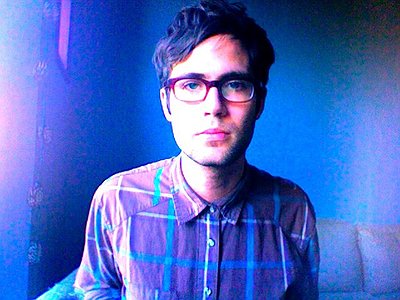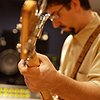Enrichment & Cross-pollination
The association with the modern art scene worked extremely well for contemporary composers for a while. Today, mutual interest seems to have waned. How important do you consider the relationship between the visual arts and composition – and do you feel both could benefit from rekindling their affections?
Dobrinka Tabakova / Any collaboration is a chance to enrich both worlds, and I feel that this is an important dialogue. Having worked with artists from the Royal College of Art, my experience is that their interest and knowledge of the new music scene is very active, and vice versa with composers whom I know. If you are interested in collaborating, you will find the people with whom you share a vision.
Nimrod Boreinstein / My father is an artist and we often discuss all aspects of creation and try to find parallels between painting and music. Writers, artists and composers have many similarities and can enormously benefit from discussing and sharing their passion. I have many friends from the world of dancing and contemporary ballet, but to me, music is something very abstract. I know that some composers do that, but for me, music is entirely music. I will have these debates with my wife, who is a strong opera lover. But for me, having something on top of the music, although not necessarily being a minus, doesn't add something. Music is a very strong medium to express things.
Bob Lord / I, too, love the fact that music is music. Ephemeral, untouchable, an aural and mental construction that can only be represented in the most basic manner in physical terms ... but it is morphing, and some of the most interesting musical moves are being made not on the concert stage but in other media, such as the games industry, where adaptive music and algorithmic composition is taking on total primacy. The complexities of composition in these fields are now pushing the outer edges of theory and technology, where there are composers creating immersive, robust, expansive musical worlds for users to explore and experience – an area where classical used to excel.
Nimrod Boreinstein / When my grandmother died a few years ago, my father, recovered some of the paintings he'd done when he was young and some of them he really liked. And he decided to re-use some of them … using part of it and surrounding it with new things. We talked about this idea of recuperation. And the equivalent in music, that if I wrote something ten years ago, I could use some of it now and write something new alongside it.
Michael Hammond / When I think about composers and artists influencing each other I inevitably think of the 50s and 60s and Feldman, Cage, Pollock, and Guston all hanging out in a cafe. It's a lovely image. I think there was something very specific about that time in New York that fostered that kind of community that allowed bonds between artists of different media. Now, everything has kind of exploded and people are so busy trying to make a name for themselves in their own world that the idea of reaching out into another artist's world can seem daunting.
That said, I've seen a number of successful collaborations between artists in recent years. One in particular that comes to mind is Brooklyn Babylon, which is a collaboration between NewAm composer/bandleader Darcy James Argue and Croatian graphic novel artist Danijel Zezelj. It started as a multimedia performance featuring Darcy's jazz big band and projections and live drawing by Danijel. It's an insanely ambitious and beautiful piece. We're releasing the album this April, and Danijel is going to have a graphic novel (just called Babilon) coming out around the same time.
Bob Lord / As melder of forms myself I believe that there is of course great validity to, and opportunity in, cross-pollination in terms of artistic platforms, but I do not feel it is necessary. "Appalachian Spring" for example now exists fully on its own, effectively divorced from the visual elements that were a part of its initial presentation (though not its conception) – and it is interesting that if you play Barber’s “Adagio” for a sample audience, you’ll probably get a majority of people citing PLATOON straight away (which of course had nothing to do with its creation) before they talk about its origins as a movement in a string quartet.










